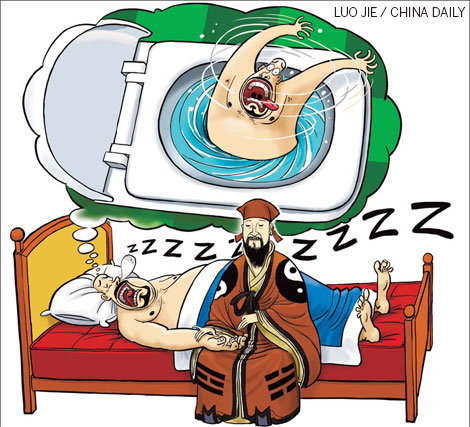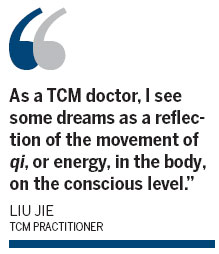

A pioneering traditional Chinese medicine doctor suggests that dreams can be early warning signs of physical problems. Ye Jun delves deeper.
For 10 years, retiree Li Rong had a recurrent nightmare, in which she fell into a countryside squat toilet and was unable to get out. "It certainly wasn't a dream of blooming flowers or a flowing stream and it didn't feel good," says the 49-year-old former laborer from Beijing.
Determined to find the reason behind this disturbing nightmare, she consulted with traditional Chinese medicine (TCM) Dr Liu Jie, at the Yu Yuan Tang Clinic in Beijing.
Liu's explanation was nothing like the traditional interpretation of dreams offered by psychoanalysts such as Sigmund Freud and Carl Jung, whose explanations were usually rooted in the subconscious.
"The toilet hole in her dream refers to the colon," Liu says. "The fact she couldn't move in the hole corresponds to the dachangshu, an acupuncture point in the back, or the second lumbar, which is close to the colon."
Liu checked Li's back to confirm his suspicion and found the third lumbar of the vertebra was out of alignment. After he corrected it, Li's nightmare was over.
The 43-year-old Liu is licensed to prescribe herbal medicine, but his specialty is structural adjustment of the body. Over the past two years, he has discovered a fascinating link between his patients' dreams and structural problems related to his patients' bodies. He is now able to use dream analysis to help with diagnosis and treatment.
"The simplest link between dreams and the body is a similarity in shape," Liu says. "For example, if you dream of an overpass, it could correspond to the colon because they have a similar structure."
 |
Likewise, dreaming of a ditch may refer to the ureter; while a pond or small lake indicates the bladder. Dreaming of the sky or clouds could refer to the lungs (air); while mountain climbing could suggest a problem with the back. If there are stairs on the mountain it is more likely to indicate a spinal dysfunction.
Liu's first dream interpretation was in January 2009. Roy Chen, a 37-year-old who works for an educational NGO helping orphans in Guangzhou, told the doctor about his dream when he was having acupuncture treatment.
Chen dreamed he was sitting in an empty subway carriage, when he discovered two lost bags on the ground, one of them red. He opened one of the bags and saw an ID card bearing his name.
Liu's interpretation suggested the subway carriage related to Chen's intestines, as they both move around in an empty space. He said the big bag referred to the stomach while the small bag was the spleen. Because the bigger bag was red, Liu reasoned there could be excessive heat in Chen's stomach.
After confirming this by taking Chen's pulse, Liu prescribed medicines to dispel the excessive heat and the acne on Chen's chin disappeared.
Liu then started recording his patients' dreams and currently has a record of more than 80, with interpretations, which he has uploaded on to his blog.
"Dreams are generally defined as conscious or unconscious brainwave activity," Liu says. "As a TCM doctor, I see some dreams as a reflection of the movement of qi, or energy, in the body, on the conscious level.
"The body has a self-checking and self-correcting system that works all the time. During the day people are too occupied to notice. But in the evening these energy changes in the body can manifest themselves as dreams."
Apart from his own dream inquiries, Liu has also referenced the Emperor Huangdi's Internal Classics, China's ancient medical bible.
"According to this book, certain dream scenarios have a relatively stable connection with the condition of the body," Liu says.
"For example, when people have excessive qi in the liver, they dream of fighting, hurting people or getting hurt. When they have kidney problems they dream of crossing a large expanse of water, or drowning. When they are hungry they dream of eating, and when they are too full, they dream of giving things away."
Another mode of dream interpretation comes from the I Ching, or Book of Changes, which suggests transformation between natural symbols.
If one dreams of an old woman, it could correspond to the kun diagram in the bagua set, the Eight Diagrams. The kun diagram is a symbol of "female" things, for example, an old woman, earth, the southwest, and the stomach. So when you dream of an old woman, it could mean something is wrong with the stomach.
Liu has adopted these parameters to analyze his patients' dreams. It is not uncommon for him now to be able to diagnose a patient's problems through their dreams. Even so, he says, he always confirms his suspicions with a physical check.
"Not all dreams are related to people's physical problems. Some are just the result of random brain activity," he says. "These are meaningless in terms of health and are not of my concern."
Other dreams might result from psychological causes. For example, when people are jealous, they might have dreams of these people being hurt. Liu says this is not his area of expertise.
"The dreams I consider meaningful are those resulting from energy changes in the body that manifest themselves as a particular feeling or scenario," Liu says. "These dreams are a warning sign to the mind from the body. This is particularly relevant when it comes to unpleasant and repeated dreams. They can be used to prevent minor, neglected illnesses, which might develop into major problems."
A China-Japan Friendship Hospital spokesman declined an interview on the basis the hospital's TCM doctors don't believe dreams can be used for diagnosis.
An Lan, a psychologist based in Beijing, however, says he agrees with Liu Jie's dream analysis theory.
"I can tell from both psychological consultations, and from my personal experience the body is a vehicle of the mind. If the mind has an obstacle to reach its goal, it will constantly try to express itself," An says.
"For example, I find psychological problems related to one's mother can result in a physical problem of the stomach. Once the psychological problem is solved, the physical problem also goes away."
An says dream analysis to determine psychological problems is fundamental for a psychologist, but he has never encountered someone who is not a psychologist relating dreams to physical problems, like Liu Jie.